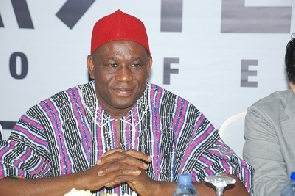 Augustine Collins Ntim, Deputy Minister of Local Government and Rural Development
Augustine Collins Ntim, Deputy Minister of Local Government and Rural Development
Augustine Collins Ntim, Deputy Minister of Local Government and Rural Development, has reiterated government’s commitment to improve on structures to help strengthen the decentralization process and transform local governance.
The focus is to empower the Metropolitan, Municipal and District Assemblies (MMDAs) to meet the prioritized needs of the people in local communities.
Addressing the maiden town hall meeting of the Sekyere-Kumawu District Assembly at Kumawu, he said proper and efficient functioning of local government structures was critical to achieving the government’s aim of improving the lives of the people, especially those in rural communities.
Mr Ntim mentioned the numerous government socio-economic and developmental interventions such as the Planting for Food and Jobs (PFJ), Planting for Export and Rural Development (PERD), Special Rice Initiative (SPI), Rearing for Food and Jobs (RFJ), among others, and said all these had been achieved as a result of the effective structures put in place at the MMDAs and the improved capacity of personnel in these departments.
He said the essence of the town hall meeting was to create a platform for all stakeholders and people in the district to assess and analyze the performance of the District Assembly over the past one year, and identify some of the shortfalls for improvement.
It was to also present to the people, government policies, projects and programmes executed so far, successes and challenges encountered, and also, seek suggestions and strategies for redress as well as sustain gains.
Again the town hall meeting was to promote accountability, transparency and inclusiveness in local governance at all levels.
Mr. Ntim urged the MMDAs to engage their communities extensively in prioritizing their needs and integrating their inputs in the selection and implementation of development projects in their communities in order to ensure acceptability, ownership and sustainability. Mr. Philip Basoah, Member of Parliament (MP) for the area, reiterated the crucial need of the decentralization process, as a catalyst for socio-economic development and nation building. He said, for the decentralization process to be successful and impactful, there was the need for the integration of all stakeholders such as traditional and religious bodies, civil society organizations, as well as the people.
Mr. Samuel Addai Agyekum, District Chief Executive (DCE), presenting the overview of government and the District Assembly’s contributions to the development of the District, commended the traditional authorities and the Assembly Members for their continuous support in facilitating development projects in their communities.
He assured the people of a judicious utilization of the Internally Generated Funds (IGF), District Assembly Common Fund (DACF), District Development Fund/Facility (DDF) and other funds received by the Assembly on behalf of the people, for the development cause in all the needed areas such as education, health, agriculture, roads and other infrastructure.
The DCE said the District Assembly was prioritizing tourism and the PERD, of which huge investments were being made in the cultivation of cash crops such as cashew, pawpaw and oil palm to help turn positively, the economic fortunes of the people in the area.
The Assembly was also building more classroom blocks, health facilities, roads, market structures, mechanized boreholes, among others to help improve social infrastructure in communities to enhance the living conditions of the people.
Nana Amakwah Adiyaa II, Chief of Akotosu and Nana Okyere Barfour, Chief of Amanfrom, both commended the government and the District Assembly for the socio-economic development in the area and pledged the readiness of the traditional council to collaborate and support the District Assembly and the government to meet its development targets.